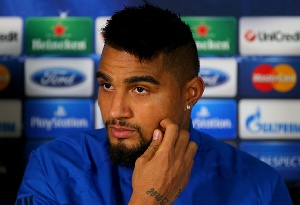Schalke's sporting director Horst Heldt had warned, in the aftermath of Sunday's dismal 2-0 defeat at FC Cologne, that there would be "consequences" for some, apparently "regardless of contractual obligations." Few expected such an immediate and dramatic fulfilment of that pledge, with Monday's announcement that Kevin-Prince Boateng and Sidney Sam were finished at the club.
Schalke's English version of their mid-morning statement that said Boateng and Sam were "released with immediate effect" was slightly mistranslated, and later corrected -- the pair had, in essence, been excused from duty with the club indefinitely, rather than released from their contracts. The ostracising of the pair, however, was complete, as Heldt made clear later in the day (as opposed to their teammate Marco Hoger, who was merely suspended for a week).
There was far greater finality to Heldt's words on Boateng and Sam. "The relationship of trust is no longer there," he said, emphasising that there is no way back for either. Club chairman Clemens Tonnies, in an interview aired on Sky Bundesliga on Monday night, backed his management. "Horst Heldt has done the right thing," he said. "I would have done this sooner, but I'm not the decision-maker. I'm fully behind the decision."
It is hard not to be cynical about Heldt's motives. Quite what it will achieve with two games to go in the season and a Champions League place already beyond them is questionable, even if the very real prospect of finishing behind local rivals Borussia Dortmund -- after a season in which Jurgen Klopp's men more than flirted with disaster -- should be something to focus minds. It is tempting to think that the under-fire Heldt is moving to protect himself (and possibly the equally pressurised coach, Roberto Di Matteo) by finding a quick scapegoat for a season of plain underachievement.
Boateng especially fits the bill well. The decision to get rid of him this summer had already been taken in the corridors of the Veltins-Arena, it seems. Askicker wrote in the aftermath of the news, Boateng's match-winning turn as substitute the previous week against Stuttgart had made everyone hope that "an honourable exit" would be possible.
After a season full of nagging injuries, only 11 Bundesliga starts and no goals, Boateng has become an expensive burden at some €8 million per season in wages according to Bild. The truth is that some of Schalke's most productive moments of the season, especially through December when league points rolled in and Champions League qualification was assured, arrived in his absence.
Quite where Boateng goes from here is open to some conjecture. Despite a solid first season in Gelsenkirchen, his time at Schalke will probably be seen as a global failure, given Die Konigsblauen's lack of progress in that time.
It should have been better than this. When Boateng arrived at the club from AC Milan in August 2013, it was a shock -- not least to Klopp, who famously sent the former Dortmund loanee a text message simply asking "Why Schalke????????" It was an even grander gesture than many of the statements of intent that the Schalke board are known for (such as the signings of Real Madrid veteran Raul and Dutch striker Klaas-Jan Huntelaar), for Boateng had thrived at Milan. He was set for a glorious homecoming to Germany.
Even if Boateng had begun to convert his talent into a capacity to grab games by the scruff of the neck at Portsmouth, few saw his move to the Italian giants coming. Many thought the arrival of such a wild card was indicative of the Rossoneri's declining status as much as anything else, but he proved plenty wrong.
Maybe he never quite had the craft to be a playmaker for one of the most celebrated clubs in world football, but he had a go. His all-action style made him popular, and there were plenty of great moments: his stunning goal against Barcelona in the Champions League after turning Eric Abidal inside out in November 2011, or the hat trick as substitute the month before at Lecce to help turn a 3-0 deficit into a 4-3 win. There was the 2011 Scudetto too, which he celebrated by moonwalking in front of a packed San Siro replete in Michael Jackson hat, white glove, white socks and dancing shoes.
There was also the sense that Boateng was growing as a man, something evident in January 2013 when he led his teammates off the pitch in a friendly with Pro Patria after becoming the target of racial abuse. By March, he was speaking at the United Nations in Geneva on the International Day for the Elimination of Racial Discrimination, evoking Martin Luther King and Muhammad Ali. Incidentally, he had displayed a humility many thought beyond him when describing that celebrated goal against Barca. "When I saw it back on television," he said, "I asked myself 'My God, how did I do that?' If you asked me to do it again today, I wouldn't be able to."
Boateng's showman tendencies have certainly not disappeared, though. He has tended to wander wherever he wishes on the pitch since arriving in Nord-Rhine Westphalia, and Schalke, quite frankly, are not a good enough team to carry an unpredictable maverick with little time for tactical protocol. He and Di Matteo are hardly a match made in heaven, it is fair to say.
If Milan got the best of him by demanding a lot of him, that has not been the case at Schalke. In February 2014, Bild published a photo of Boateng in a doping test after victory over Bayer Leverkusen, idly browsing his smartphone with a cigarette in one hand and a bottle of beer in the other. On that occasion, Heldt stuck up for him and his right to "relax after a win."
That's been Boateng's problem at Schalke. He can do what he likes if they win, but if it goes wrong, it's all his fault. Somebody will happily take him on this summer. If the current regime remains at Milan, it isn't hard to imagine Adriano Galliani's eyes lighting up at the prospect of a bargain. One can only hope that his new club knows what they're getting and handles him accordingly.
Sports News of Friday, 15 May 2015
Source: ESPN













